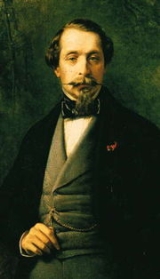
List of Presidents of the French Republic
Encyclopedia
This is a list of Presidents of France. The first President of France is considered to be Louis-Napoléon Bonaparte (later Napoleon III), who was elected in the 1848 election
, under the French Second Republic
. The current President is Nicolas Sarkozy
, who was elected in the 2007 election
.
French First Republic
Executive Commission
President of the Government of National Defense
served as Acting President whenever the office of President was vacant.
The office of President of the French Republic did not exist from 1940 until 1947.
French presidential election, 1848
The first-ever French presidential election of 1848 elected the first—and only—President of the Second Republic. The election was held on 10 December 1848 and led to the surprise victory of Louis-Napoléon Bonaparte with 74% of the vote.-Election:...
, under the French Second Republic
French Second Republic
The French Second Republic was the republican government of France between the 1848 Revolution and the coup by Louis-Napoléon Bonaparte which initiated the Second Empire. It officially adopted the motto Liberté, Égalité, Fraternité...
. The current President is Nicolas Sarkozy
Nicolas Sarkozy
Nicolas Sarkozy is the 23rd and current President of the French Republic and ex officio Co-Prince of Andorra. He assumed the office on 16 May 2007 after defeating the Socialist Party candidate Ségolène Royal 10 days earlier....
, who was elected in the 2007 election
French presidential election, 2007
The 2007 French presidential election, the ninth of the Fifth French Republic was held to elect the successor to Jacques Chirac as president of France for a five-year term.The winner, decided on 5 and 6 May 2007, was Nicolas Sarkozy...
.
French First RepublicFrench First RepublicThe French First Republic was founded on 22 September 1792, by the newly established National Convention. The First Republic lasted until the declaration of the First French Empire in 1804 under Napoleon I...
(1792–1804)
- National ConventionNational ConventionDuring the French Revolution, the National Convention or Convention, in France, comprised the constitutional and legislative assembly which sat from 20 September 1792 to 26 October 1795 . It held executive power in France during the first years of the French First Republic...
(20 September 1792 – 2 November 1795), with Maximilien RobespierreMaximilien RobespierreMaximilien François Marie Isidore de Robespierre is one of the best-known and most influential figures of the French Revolution. He largely dominated the Committee of Public Safety and was instrumental in the period of the Revolution commonly known as the Reign of Terror, which ended with his...
as leading member of the Convention's Committee of Public SafetyCommittee of Public SafetyThe Committee of Public Safety , created in April 1793 by the National Convention and then restructured in July 1793, formed the de facto executive government in France during the Reign of Terror , a stage of the French Revolution...
(27 July 1793 – 27 July 1794) - DirectoryFrench DirectoryThe Directory was a body of five Directors that held executive power in France following the Convention and preceding the Consulate...
(2 November 1795 – 10 November 1799), with Paul BarrasPaul François Jean Nicolas, vicomte de BarrasPaul François Jean Nicolas, vicomte de Barras was a French politician of the French Revolution, and the main executive leader of the Directory regime of 1795–1799.-Early life:...
as leading member of the Directory - ConsulateFrench ConsulateThe Consulate was the government of France between the fall of the Directory in the coup of 18 Brumaire in 1799 until the start of the Napoleonic Empire in 1804...
(10 November 1799 – 18 May 1804), with Napoleon Bonaparte as First Consul
President of the Provisional Government of the Republic
- Jacques-Charles Dupont de l'EureJacques-Charles Dupont de l'EureJacques-Charles Dupont de l'Eure was a French lawyer and statesman.He is best known as the first head of state of the Second Republic, after the collapse of the July Monarchy.-Early career:...
(24 February 1848 – 9 May 1848)
Executive CommissionFrench Executive Commission (1848)The Executive Commission of the French Republic was a short-lived body and jointly head of state of France during the Second Republic. All members were equal and served together as co-heads of state.The Commission acted as head of state from May 10 to June 24, 1848, between governments of...
(10 May 1848 – 24 June 1848)
- Members:
- François AragoFrançois AragoFrançois Jean Dominique Arago , known simply as François Arago , was a French mathematician, physicist, astronomer and politician.-Early life and work:...
- Alphonse de LamartineAlphonse de LamartineAlphonse Marie Louis de Prat de Lamartine was a French writer, poet and politician who was instrumental in the foundation of the Second Republic.-Career:...
- Louis-Antoine Garnier-PagèsLouis-Antoine Garnier-PagèsLouis-Antoine Garnier-Pagès , French politician, fought on the barricades during the revolution of July....
- Alexandre Auguste Ledru-RollinAlexandre Auguste Ledru-RollinAlexandre Auguste Ledru-Rollin was a French politician.The grandson of Nicolas Philippe Ledru, the celebrated quack doctor known as "Comus" under Louis XV and Louis XVI, Ledru-Rollin was born in a house that had once been Paul Scarron's, at Fontenay-aux-Roses...
- Pierre Marie (de Saint-Georges)Pierre Marie (de Saint-Georges)Pierre Marie or Alexandre-Pierre-Thomas-Amable Marie de Saint Georges was a French politician, fought on the barricades during the revolution of July....
- François Arago
President
Political Party:| Nº | Picture | Name (Birth–Death) |
Term of Office; Electoral mandates |
Political Party | Ref. | |
|---|---|---|---|---|---|---|
| 1 | 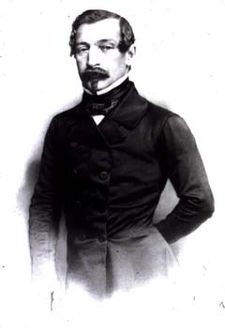 |
Louis-Napoléon Bonaparte (1808–1873) |
20 December 1848 | 2 December 1852 | Bonapartist Bonapartist In French political history, Bonapartism has two meanings. In a strict sense, this term refers to people who aimed to restore the French Empire under the House of Bonaparte, the Corsican family of Napoleon Bonaparte and his nephew Louis... |
|
| 1848 French presidential election, 1848 The first-ever French presidential election of 1848 elected the first—and only—President of the Second Republic. The election was held on 10 December 1848 and led to the surprise victory of Louis-Napoléon Bonaparte with 74% of the vote.-Election:... |
||||||
| Nephew of Napoleon I. Elected first President of the French Republic, in the 1848 election French presidential election, 1848 The first-ever French presidential election of 1848 elected the first—and only—President of the Second Republic. The election was held on 10 December 1848 and led to the surprise victory of Louis-Napoléon Bonaparte with 74% of the vote.-Election:... against Louis-Eugène Cavaignac. He provoked the French coup of 1851 French coup of 1851 The French coup d'état on 2 December 1851, staged by Prince Louis-Napoléon Bonaparte , ended in the successful dissolution of the French National Assembly, as well as the subsequent re-establishment of the French Empire the next year... , and proclaimed himself Emperor Second French Empire The Second French Empire or French Empire was the Imperial Bonapartist regime of Napoleon III from 1852 to 1870, between the Second Republic and the Third Republic, in France.-Rule of Napoleon III:... the following year. |
||||||
President of the Government of National DefenseGovernment of National DefenseLe Gouvernement de la Défense Nationale, or The Government of National Defence, was the first Government of the Third Republic of France from September 4, 1870, to February 13, 1871, during the Franco-Prussian War, formed after the Emperor Louis Napoleon III was captured by the Prussian army. The...
- Louis Jules TrochuLouis Jules TrochuLouis Jules Trochu was a French military leader and politician. He served as President of the Government of National Defense—France's de facto head of state—from 4 September 1870 until his resignation on 22 January 1871 .- Military career :He was born at Palais...
(4 September 1870 – 13 February 1871)
Chief of the Executive Power
- Adolphe ThiersAdolphe ThiersMarie Joseph Louis Adolphe Thiers was a French politician and historian. was a prime minister under King Louis-Philippe of France. Following the overthrow of the Second Empire he again came to prominence as the French leader who suppressed the revolutionary Paris Commune of 1871...
(17 February 1871 – 30 August 1871) (became President on 31 August 1871)
Presidents
| Nº | Picture | Name (Birth–Death) |
Term of Office | Political Party | Ref. | |
|---|---|---|---|---|---|---|
| 2 | Adolphe Thiers Adolphe Thiers Marie Joseph Louis Adolphe Thiers was a French politician and historian. was a prime minister under King Louis-Philippe of France. Following the overthrow of the Second Empire he again came to prominence as the French leader who suppressed the revolutionary Paris Commune of 1871... (1797–1877) |
31 August 1871 | 24 May 1873 | former Orléanist Orléanist The Orléanists were a French right-wing/center-right party which arose out of the French Revolution. It governed France 1830-1848 in the "July Monarchy" of king Louis Philippe. It is generally seen as a transitional period dominated by the bourgeoisie and the conservative Orleanist doctrine in... ; moderate Republican Republicanism Republicanism is the ideology of governing a nation as a republic, where the head of state is appointed by means other than heredity, often elections. The exact meaning of republicanism varies depending on the cultural and historical context... |
||
| Initially a moderate monarchist, named President following the adoption of the Rivet law. He became a Republican during his term, and resigned in the face of hostility from the Assemblée nationale, largely in favour of a return to monarchy. | ||||||
| 3 | Patrice de Mac-Mahon (1808–1893) |
24 May 1873 | 30 January 1879 | Legitimist | ||
| A Marshal of France Marshal of France The Marshal of France is a military distinction in contemporary France, not a military rank. It is granted to generals for exceptional achievements... , he was the only monarchist President of the Third Republic. He resigned shortly after the Republican victory in the 1877 legislative elections, following his decision 16 May 1877 crisis The 16 May 1877 crisis was a constitutional crisis in the French Third Republic concerning the distribution of power between the President and the legislature. When the Royalist President Patrice MacMahon dismissed the Opportunist Republican Prime Minister Jules Simon, parliament on 16 May 1877... to dissolve the Chamber of Deputies Chamber of Deputies of France Chamber of Deputies was the name given to several parliamentary bodies in France in the nineteenth and twentieth centuries:* 1814–1848 during the Bourbon Restoration and the July Monarchy, the Chamber of Deputies was the Lower chamber of the French Parliament, elected by census suffrage.*... . During his term, the French Constitutional Laws of 1875 French Constitutional Laws of 1875 The Constitutional Laws of 1875 are the laws passed in France by the National Assembly between February and July 1875 which established the Third French Republic.The constitution laws could be roughly divided into three laws:... that served as the Constitution of the Third Republic were passed, and he therefore became the first President under the constitutional settlement that would last until 1940. |
||||||
| 4 | Jules Grévy Jules Grévy François Paul Jules Grévy was a President of the French Third Republic and one of the leaders of the Opportunist Republicans faction. Given that his predecessors were monarchists who tried without success to restore the French monarchy, Grévy is seen as the first real republican President of... (1807–1891) |
30 January 1879 | 2 December 1887 | Opportunist Republican; Left Republican |
||
| The first President to complete a full term, he was easily re-elected in December 1885. He was nonetheless forced to resign, following an honours scandal in which his son-in-law was implicated. | ||||||
| 5 | Marie François Sadi Carnot Marie François Sadi Carnot Marie François Sadi Carnot was a French statesman and the fourth president of the Third French Republic. He served as the President of France from 1887 until his assassination in 1894.-Early life:... (1837–1894) |
3 December 1887 | 25 June 1894† | Opportunist Republican; Left Republican |
||
| His term was marked by boulangist unrest and the Panama scandals Panama scandals The Panama scandals was a corruption affair that broke out in the French Third Republic in 1892, linked to the building of the Panama Canal... , and by diplomacy with Russia. †Assassinated (stabbed) by Sante Geronimo Caserio a few months before the end of his mandate, he is interred at the Panthéon, Paris Panthéon, Paris The Panthéon is a building in the Latin Quarter in Paris. It was originally built as a church dedicated to St. Genevieve and to house the reliquary châsse containing her relics but, after many changes, now functions as a secular mausoleum containing the remains of distinguished French citizens... . |
||||||
| 6 | 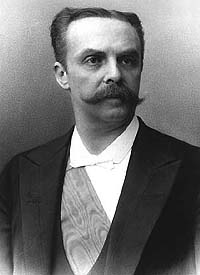 |
Jean Casimir-Perier Jean Casimir-Perier Jean Paul Pierre Casimir-Perier was a French politician, fifth president of the French Third Republic.-Biography:He was born in Paris, the son of Auguste Casimir-Perier and the grandson of Casimir Pierre Perier, premier of Louis Philippe... (1847–1907) |
27 June 1894 | 16 January 1895 | Opportunist Republican; Left Republican |
|
| Perier's was the shortest Presidential term: he resigned after six months and 20 days. | ||||||
| 7 | 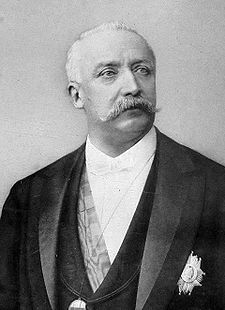 |
Félix Faure Félix Faure Félix François Faure was President of France from 1895 until his death.-Biography:Félix François Faure was born in Paris, the son of a small furniture maker... (1841–1899) |
17 January 1895 | 16 February 1899† | Opportunist Republican; Progressive Republican Progressive Republicans (France) The Progressive Republicans were a French parliamentary group in the Chamber of Deputies of France during the first half of the French Third Republic. The Progressives were in fact the most conservative members of the Chamber, and most later went on the form the Republican Federation.... |
|
| Pursued colonial expansion and ties with Russia. President during the Dreyfus Affair Dreyfus Affair The Dreyfus affair was a political scandal that divided France in the 1890s and the early 1900s. It involved the conviction for treason in November 1894 of Captain Alfred Dreyfus, a young French artillery officer of Alsatian Jewish descent... . †Four years into his term he died of apoplexy at the Élysée Palace Élysée Palace The Élysée Palace is the official residence of the President of the French Republic, containing his office, and is where the Council of Ministers meets. It is located near the Champs-Élysées in Paris.... , allegedly in flagrante. |
||||||
| 8 | 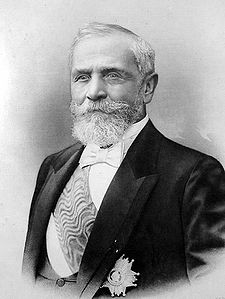 |
Émile Loubet Émile Loubet Émile François Loubet was a French politician and the 8th President of France.-Early life:He was born the son of a peasant proprietor and mayor of Marsanne . Admitted to the Parisian bar in 1862, he took his doctorate in law the next year... (1838–1929) |
18 February 1899 | 18 February 1906 | Democratic Republican Alliance Democratic Republican Alliance The Democratic Republican Alliance was a French political party created in 1901 by followers of Léon Gambetta, such as Raymond Poincaré who would be president of the Council in the 1920s... |
|
| During his seven-year term, the 1905 French law on the Separation of the Churches and the State was adopted, and only four Presidents of the Council President of the Council of Ministers The official title President of the Council of Ministers, or Chairman of the Council of Ministers is used to describe the head of government of the states of Italy and Poland, and formerly in the Soviet Union, Portugal, France , Spain , Brazil , and Luxembourg... succeeded to the Hôtel Matignon Hôtel Matignon The Hôtel Matignon is the official residence of the Prime Minister of France. It is located in the VIIe arrondissement of Paris, France.The address of Hotel Matignon is 57 rue de Varenne, Paris, France.-History:... . He did not seek re-election at the end of his term. |
||||||
| 9 |  |
Armand Fallières Armand Fallières Clément Armand Fallières was a French politician, president of the French republic from 1906 to 1913.He was born at Mézin in the département of Lot-et-Garonne, France, where his father was clerk of the peace... (1841–1931) |
18 February 1906 | 18 February 1913 | Opportunist Republican; ARD-PRD Democratic Republican Alliance The Democratic Republican Alliance was a French political party created in 1901 by followers of Léon Gambetta, such as Raymond Poincaré who would be president of the Council in the 1920s... |
|
| President during the Agadir Crisis Agadir Crisis The Agadir Crisis, also called the Second Moroccan Crisis, or the Panthersprung, was the international tension sparked by the deployment of the German gunboat Panther, to the Moroccan port of Agadir on July 1, 1911.-Background:... , when French troops first occupied Morocco. He was a party to the Triple Entente Triple Entente The Triple Entente was the name given to the alliance among Britain, France and Russia after the signing of the Anglo-Russian Entente in 1907.... , which he strengthened by diplomacy. Like his predecessor, he did not seek re-election. |
||||||
| 10 | 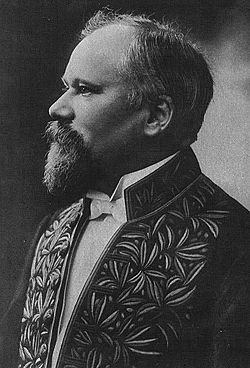 |
Raymond Poincaré Raymond Poincaré Raymond Poincaré was a French statesman who served as Prime Minister of France on five separate occasions and as President of France from 1913 to 1920. Poincaré was a conservative leader primarily committed to political and social stability... (1860–1934) |
18 February 1913 | 18 February 1920 | PRD-ARD Democratic Republican Alliance The Democratic Republican Alliance was a French political party created in 1901 by followers of Léon Gambetta, such as Raymond Poincaré who would be president of the Council in the 1920s... |
|
| President during World War I. He subsequently served as President of the Council President of the Council of Ministers The official title President of the Council of Ministers, or Chairman of the Council of Ministers is used to describe the head of government of the states of Italy and Poland, and formerly in the Soviet Union, Portugal, France , Spain , Brazil , and Luxembourg... 1922–1924 and 1926–1929. |
||||||
| 11 | Paul Deschanel Paul Deschanel Paul Eugène Louis Deschanel was a French statesman. He served as President of France from 18 February 1920 to 21 September 1920.-Biography:... (1855–1922) |
18 February 1920 | 21 September 1920 | ARD-PRDS Democratic Republican Alliance The Democratic Republican Alliance was a French political party created in 1901 by followers of Léon Gambetta, such as Raymond Poincaré who would be president of the Council in the 1920s... |
||
| An intellectual elected to the Académie française Académie française L'Académie française , also called the French Academy, is the pre-eminent French learned body on matters pertaining to the French language. The Académie was officially established in 1635 by Cardinal Richelieu, the chief minister to King Louis XIII. Suppressed in 1793 during the French Revolution,... , he overcame the popular Georges Clemenceau Georges Clemenceau Georges Benjamin Clemenceau was a French statesman, physician and journalist. He served as the Prime Minister of France from 1906 to 1909, and again from 1917 to 1920. For nearly the final year of World War I he led France, and was one of the major voices behind the Treaty of Versailles at the... , to general surprise, in the January 1920 election. He resigned after eight months due to mental health problems. |
||||||
| 12 | 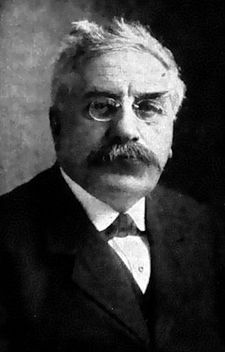 |
Alexandre Millerand Alexandre Millerand Alexandre Millerand was a French socialist politician. He was President of France from 23 September 1920 to 11 June 1924 and Prime Minister of France 20 January to 23 September 1920... (1859–1943) |
23 September 1920 | 11 June 1924 | Independent Independent (politician) In politics, an independent or non-party politician is an individual not affiliated to any political party. Independents may hold a centrist viewpoint between those of major political parties, a viewpoint more extreme than any major party, or they may have a viewpoint based on issues that they do... |
|
| An "Independent Socialist Independent Socialists (France) The Independent Socialists were a French political movement and, at times, parliamentary group in the Chamber of Deputies of France during the French Third Republic. The movement was strong from 1880 till the fall of the Republic in 1940.... " increasingly drawn to the right wing, he resigned after four years following the victory of the Cartel des Gauches Cartel des Gauches The Cartel des gauches was the name of the governmental alliance between the Radical-Socialist Party and the socialist French Section of the Workers' International after World War I , which lasted until the end of the Popular Front . The Cartel des gauches twice won general elections, in 1924 and... in the 1924 legislative elections. |
||||||
| 13 | 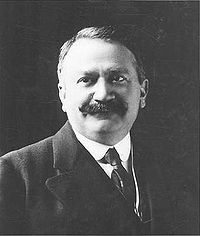 |
Gaston Doumergue Gaston Doumergue Pierre-Paul-Henri-Gaston Doumergue was a French politician of the Third Republic.Doumergue came from a Protestant family. Beginning as a Radical, he turned more towards the political right in his old age. He served as Prime Minister from 9 December 1913 to 2 June 1914... (1863–1937) |
13 June 1924 | 13 June 1931 | Radical | |
| The first Protestant President, he took a firm political stance against Germany and its resurgent nationalism. His seven-year term was marked by ministerial discontinuity. | ||||||
| 14 | 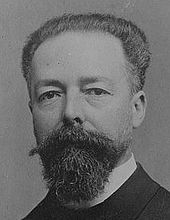 |
Paul Doumer Paul Doumer Joseph Athanase Paul Doumer, commonly known as Paul Doumer was the President of France from 13 June 1931 until his assassination.-Biography:... (1857–1932) |
13 June 1931 | 7 May 1932† | Radical | |
| Elected in the second round of the 1931 election, having displaced the pacifist Aristide Briand Aristide Briand Aristide Briand was a French statesman who served eleven terms as Prime Minister of France during the French Third Republic and received the 1926 Nobel Peace Prize.- Early life :... . †Assassinated (shot) by the mentally unstable Paul Gorguloff Paul Gorguloff Paul Gorguloff, originally Pavel Timofeyevich Gorgulov was a Russian emigre who assassinated French President Paul Doumer at a book fair in 1932. Gorgulov was born in Labinskaya, Russia and died at La Santé prison in Paris, France by guillotine. His defence of insanity was rejected... . |
||||||
| 15 | 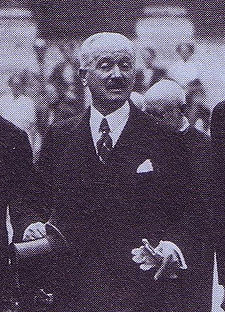 |
Albert Lebrun (1871–1950) |
10 May 1932 | 11 July 1940 (de facto) |
Democratic Alliance Democratic Republican Alliance The Democratic Republican Alliance was a French political party created in 1901 by followers of Léon Gambetta, such as Raymond Poincaré who would be president of the Council in the 1920s... |
|
| Re-elected in 1939, his second term was interrupted de facto by the rise to power of Marshal Philippe Pétain Philippe Pétain Henri Philippe Benoni Omer Joseph Pétain , generally known as Philippe Pétain or Marshal Pétain , was a French general who reached the distinction of Marshal of France, and was later Chief of State of Vichy France , from 1940 to 1944... . |
||||||
Acting Presidents
Under the Third Republic, the President of the CouncilPrime Minister of France
The Prime Minister of France in the Fifth Republic is the head of government and of the Council of Ministers of France. The head of state is the President of the French Republic...
served as Acting President whenever the office of President was vacant.
- Jules Armand DufaureJules Armand DufaureJules Armand Stanislas Dufaure was a French statesman.-Biography:Dufaure was born at Saujon, Charente-Maritime, and began his career as an advocate at Bordeaux, where he won a great reputation by his oratorical gifts. He abandoned law for politics, and in 1834 was elected deputy...
(30 January 1879) - Maurice RouvierMaurice RouvierMaurice Rouvier was a French statesman.He was born in Aix-en-Provence, and spent his early career in business at Marseille. He supported Léon Gambetta's candidature there in 1867, and in 1870 he founded an anti-imperial journal, L'Egalité. Becoming secretary general of the prefecture of...
(2–3 December 1887) - Charles DupuyCharles DupuyCharles Alexandre Dupuy was a French statesman, three times prime minister.-Biography:He was born in Le Puy-en-Velay, Haute-Loire, Auvergne, where his father was a minor official. After a period as a professor of philosophy in the provinces, he was appointed a school inspector, thus obtaining a...
(25–27 June 1894, 16–17 January 1895 and 16–18 February 1899) - Alexandre MillerandAlexandre MillerandAlexandre Millerand was a French socialist politician. He was President of France from 23 September 1920 to 11 June 1924 and Prime Minister of France 20 January to 23 September 1920...
(21–23 September 1920) - Frédéric François-MarsalFrédéric François-MarsalFrédéric François-Marsal was a French Politician of the Third Republic, who served briefly as Prime Minister in 1924. Due to his premiership he also served for two days as the Acting President of the French Republic between resignation of Alexandre Millerand and election of Gaston...
(11–13 June 1924) - André TardieuAndré TardieuAndré Pierre Gabriel Amédée Tardieu was three times Prime Minister of France and a dominant figure of French political life in 1929-1932.-Biography:...
(7–10 May 1932)
The office of President of the French Republic did not exist from 1940 until 1947.
Chief of State
- MarshalMarshal of FranceThe Marshal of France is a military distinction in contemporary France, not a military rank. It is granted to generals for exceptional achievements...
Philippe PétainPhilippe PétainHenri Philippe Benoni Omer Joseph Pétain , generally known as Philippe Pétain or Marshal Pétain , was a French general who reached the distinction of Marshal of France, and was later Chief of State of Vichy France , from 1940 to 1944...
(11 July 1940 – 20 August 1944)
Chairmen of the Provisional Government
- Charles de GaulleCharles de GaulleCharles André Joseph Marie de Gaulle was a French general and statesman who led the Free French Forces during World War II. He later founded the French Fifth Republic in 1958 and served as its first President from 1959 to 1969....
(3 July 1944 – 26 January 1946) - Félix GouinFélix GouinFélix Gouin was a French Socialist politician, member of the French Section of the Workers' International .-Personal life:Félix Gouin was born in Peypin, Bouches-du-Rhône, the son of school teachers...
(26 January 1946 – 24 June 1946) - Georges BidaultGeorges BidaultGeorges-Augustin Bidault was a French politician. During World War II, he was active in the French Resistance. After the war, he served as foreign minister and prime minister on several occasions before he joined the Organisation armée secrète.-Early life:...
(24 June 1946 – 28 November 1946) - Vincent AuriolVincent AuriolVincent Jules Auriol was a French politician who served as the first President of the Fourth Republic from 1947 to 1954. He also served as interim President of the Provisional Government from November to December 1946, making him one of only three people who were heads of state of the French...
(interim) (28 November 1946 – 16 December 1946) - Léon BlumLéon BlumAndré Léon Blum was a French politician, usually identified with the moderate left, and three times the Prime Minister of France.-First political experiences:...
(16 December 1946 – 16 January 1947)
Presidents
Political Party:| Nº | Picture | Name (Birth–Death) |
Term of Office; Electoral mandates |
Political Party | Ref. | |
|---|---|---|---|---|---|---|
| 16 |  |
Vincent Auriol Vincent Auriol Vincent Jules Auriol was a French politician who served as the first President of the Fourth Republic from 1947 to 1954. He also served as interim President of the Provisional Government from November to December 1946, making him one of only three people who were heads of state of the French... (1884–1966) |
16 January 1947 | 16 January 1954 | French Section of the Workers' International | |
| 1947 French presidential election, 1947 Indirect presidential elections were held in France on 16 January 1947. All members of the Parliament of France voted to elect the first President of the Fourth Republic.... |
||||||
| First President of the Fourth Republic, his term was marked by the First Indochina War First Indochina War The First Indochina War was fought in French Indochina from December 19, 1946, until August 1, 1954, between the French Union's French Far East... . |
||||||
| 17 | René Coty René Coty René Jules Gustave Coty was President of France from 1954 to 1959. He was the second and last president under the French Fourth Republic.-Early life and politics:... (1882–1962) |
16 January 1954 | 8 January 1959 | National Centre of Independents and Peasants National Centre of Independents and Peasants The National Centre of Independents and Peasants is a liberal-conservative and conservative-liberal political party in France, founded in 1949 by the merger of the National Centre of Independents with the... |
||
| 1953 French presidential election, 1953 Indirect presidential elections were held in France in December, 1953. All members of the Parliament of France voted to elect the second President of the Fourth Republic.The independent René Coty won after thirteen rounds of voting.... |
||||||
| Presidency marked by the Algerian War; appealed to Charles de Gaulle Charles de Gaulle Charles André Joseph Marie de Gaulle was a French general and statesman who led the Free French Forces during World War II. He later founded the French Fifth Republic in 1958 and served as its first President from 1959 to 1969.... to resolve the May 1958 crisis May 1958 crisis The May 1958 crisis was a political crisis in France during the turmoil of the Algerian War of Independence which led to the return of Charles de Gaulle to political responsibilities after a ten year absence... . Following the promulgation of the Fifth Republic French Fifth Republic The Fifth Republic is the fifth and current republican constitution of France, introduced on 4 October 1958. The Fifth Republic emerged from the collapse of the French Fourth Republic, replacing the prior parliamentary government with a semi-presidential system... , he resigned after five years as President, giving way to de Gaulle. |
||||||
Presidents
Political Party:| Nº | Picture | Name (Birth–Death) |
Term of Office; Electoral mandates |
Political Party | Ref. | |
|---|---|---|---|---|---|---|
| 18 |  |
Charles de Gaulle Charles de Gaulle Charles André Joseph Marie de Gaulle was a French general and statesman who led the Free French Forces during World War II. He later founded the French Fifth Republic in 1958 and served as its first President from 1959 to 1969.... (1890–1970) |
8 January 1959 | 28 April 1969 | Union for the New Republic (renamed Union for the Defence of the Republic in 1968) |
|
| 1958 French presidential election, 1958 The French presidential election of 1958, the first of the French Fifth Republic, took place on December 21, 1958. This was the only French presidential election by the electoral college .-First round:To win, a candidate... , 1965 French presidential election, 1965 The 1965 French presidential election was the first presidential election by direct universal suffrage of the Fifth Republic. It was also the first presidential election by direct universal suffrage since the Second Republic in 1848. It was won by incumbent president Charles de Gaulle who resigned... |
||||||
| President of the Provisional Government Provisional Government of the French Republic The Provisional Government of the French Republic was an interim government which governed France from 1944 to 1946, following the fall of Vichy France and prior to the Fourth French Republic.... 1944–1946. Appointed President of the Council President of the Council of Ministers The official title President of the Council of Ministers, or Chairman of the Council of Ministers is used to describe the head of government of the states of Italy and Poland, and formerly in the Soviet Union, Portugal, France , Spain , Brazil , and Luxembourg... by René Coty René Coty René Jules Gustave Coty was President of France from 1954 to 1959. He was the second and last president under the French Fourth Republic.-Early life and politics:... in May 1958, to resolve the crisis of the Algerian War. He adopted a new Constitution, thus founding the Fifth Republic. Easily elected President in the 1958 election French presidential election, 1958 The French presidential election of 1958, the first of the French Fifth Republic, took place on December 21, 1958. This was the only French presidential election by the electoral college .-First round:To win, a candidate... by electoral college, he took office the following month; he was re-elected by universal suffrage in the 1965 election French presidential election, 1965 The 1965 French presidential election was the first presidential election by direct universal suffrage of the Fifth Republic. It was also the first presidential election by direct universal suffrage since the Second Republic in 1848. It was won by incumbent president Charles de Gaulle who resigned... . In 1966, he withdrew France from NATO integrated military command, and expelled the American bases on French soil. Having refused to step down during the crisis of May 1968, he finally resigned following the failure of the 1969 referendum on regionalisation French constitutional referendum, 1969 A constitutional referendum was held in France on 27 April 1969. The reforms would have led to government decentralization and changes to the Senate... . |
||||||
| — |  |
Alain Poher Alain Poher Alain Émile Louis Marie Poher was a French centrist politician, affiliated first with the Popular Republican Movement and later with the Democratic Centre. He served as a Senator for Val-de-Marne from 1946 to 1995. He was President of the Senate from 3 October 1968 to 1 October 1992 and, in that... (interim) (1909–1990) |
28 April 1969 | 20 June 1969 | Democratic Centre Democratic Centre (France) Democratic Centre was a French Christian-Democratic and centrist party. It existed from 1966 to 1976 when it merged with another party into the Centre of Social Democrats.- History :... |
|
| Interim President, as President of the Senate. Defeated by Georges Pompidou Georges Pompidou Georges Jean Raymond Pompidou was a French politician. He was Prime Minister of France from 1962 to 1968, holding the longest tenure in this position, and later President of the French Republic from 1969 until his death in 1974.-Biography:... in the second round of the 1969 election French presidential election, 1969 The 1969 French presidential election took place on 1 June and 15 June 1969. It occurred due to the resignation of President Charles de Gaulle on 28 April 1969. Indeed, De Gaulle had decided to consult the voters by referendum about regionalisation and the reform of the Senate, and he had announced... . |
||||||
| 19 |  |
Georges Pompidou Georges Pompidou Georges Jean Raymond Pompidou was a French politician. He was Prime Minister of France from 1962 to 1968, holding the longest tenure in this position, and later President of the French Republic from 1969 until his death in 1974.-Biography:... (1911–1974) |
20 June 1969 | 2 April 1974† | Union for the Defence of the Republic (renamed Union of Democrats for the Republic in 1971) |
|
| 1969 French presidential election, 1969 The 1969 French presidential election took place on 1 June and 15 June 1969. It occurred due to the resignation of President Charles de Gaulle on 28 April 1969. Indeed, De Gaulle had decided to consult the voters by referendum about regionalisation and the reform of the Senate, and he had announced... |
||||||
| Prime Minister Prime Minister of France The Prime Minister of France in the Fifth Republic is the head of government and of the Council of Ministers of France. The head of state is the President of the French Republic... under Charles de Gaulle Charles de Gaulle Charles André Joseph Marie de Gaulle was a French general and statesman who led the Free French Forces during World War II. He later founded the French Fifth Republic in 1958 and served as its first President from 1959 to 1969.... 1962–1968. Elected President in the 1969 election French presidential election, 1969 The 1969 French presidential election took place on 1 June and 15 June 1969. It occurred due to the resignation of President Charles de Gaulle on 28 April 1969. Indeed, De Gaulle had decided to consult the voters by referendum about regionalisation and the reform of the Senate, and he had announced... against the centrist Alain Poher Alain Poher Alain Émile Louis Marie Poher was a French centrist politician, affiliated first with the Popular Republican Movement and later with the Democratic Centre. He served as a Senator for Val-de-Marne from 1946 to 1995. He was President of the Senate from 3 October 1968 to 1 October 1992 and, in that... . Favoured European integration. Supported economic modernisation and industrialisation. Faced the 1973 oil crisis 1973 oil crisis The 1973 oil crisis started in October 1973, when the members of Organization of Arab Petroleum Exporting Countries or the OAPEC proclaimed an oil embargo. This was "in response to the U.S. decision to re-supply the Israeli military" during the Yom Kippur war. It lasted until March 1974. With the... . †Died in office of Waldenström's macroglobulinemia, two years before the end of his mandate. |
||||||
| — |  |
Alain Poher Alain Poher Alain Émile Louis Marie Poher was a French centrist politician, affiliated first with the Popular Republican Movement and later with the Democratic Centre. He served as a Senator for Val-de-Marne from 1946 to 1995. He was President of the Senate from 3 October 1968 to 1 October 1992 and, in that... (interim) (1909–1990) |
2 April 1974 | 27 May 1974 | Democratic Centre Democratic Centre (France) Democratic Centre was a French Christian-Democratic and centrist party. It existed from 1966 to 1976 when it merged with another party into the Centre of Social Democrats.- History :... |
|
| Interim President, as President of the Senate. Did not stand against Valéry Giscard d'Estaing Valéry Giscard d'Estaing Valéry Marie René Georges Giscard d'Estaing is a French centre-right politician who was President of the French Republic from 1974 until 1981... in the 1974 election French presidential election, 1974 Presidential elections were held in :France in 1974, following the death of President Georges Pompidou. They went to a second round, and were won by Valéry Giscard d'Estaing by a margin of 1.6%... . |
||||||
| 20 | Valéry Giscard d'Estaing Valéry Giscard d'Estaing Valéry Marie René Georges Giscard d'Estaing is a French centre-right politician who was President of the French Republic from 1974 until 1981... (1926– ) |
27 May 1974 | 21 May 1981 | Independent Republicans Independent Republicans The Independent Republicans were a French liberal-conservative political group founded in 1962, which became a political party in 1966 . The leader was Valéry Giscard d'Estaing.... (until 1977) Republican Party Republican Party (France) The Republican Party was a French right-wing political party founded in 1977. It replaced the National Federation of the Independent Republicans that was founded in 1966. It was created by former President of France Valéry Giscard d'Estaing... (from 1977) (within Union for French Democracy Union for French Democracy The Union for French Democracy was a French centrist political party. It was founded in 1978 as an electoral alliance to support President Valéry Giscard d'Estaing in order to counterbalance the Gaullist preponderance over the right. This name was chosen due to the title of Giscard d'Estaing's... from 1978) |
||
| 1974 French presidential election, 1974 Presidential elections were held in :France in 1974, following the death of President Georges Pompidou. They went to a second round, and were won by Valéry Giscard d'Estaing by a margin of 1.6%... |
||||||
| Founder of the FNRI Independent Republicans The Independent Republicans were a French liberal-conservative political group founded in 1962, which became a political party in 1966 . The leader was Valéry Giscard d'Estaing.... and later the UDF Union for French Democracy The Union for French Democracy was a French centrist political party. It was founded in 1978 as an electoral alliance to support President Valéry Giscard d'Estaing in order to counterbalance the Gaullist preponderance over the right. This name was chosen due to the title of Giscard d'Estaing's... in his efforts to unify the centre-right, he served in several Gaullist governments. Narrowly elected in the 1974 election French presidential election, 1974 Presidential elections were held in :France in 1974, following the death of President Georges Pompidou. They went to a second round, and were won by Valéry Giscard d'Estaing by a margin of 1.6%... , he instigated numerous reforms, including the lowering of the age of civil majority from 21 to 18, and the legalisation of abortion. He soon faced a global economic crisis and rising unemployment. Although the polls initially gave him a lead, he was beaten in the 1981 election French presidential election, 1981 The French presidential election of 1981 took place on 10 May 1981, giving the presidency of France to François Mitterrand, the first Socialist president of the Fifth Republic.... by François Mitterrand François Mitterrand François Maurice Adrien Marie Mitterrand was the 21st President of the French Republic and ex officio Co-Prince of Andorra, serving from 1981 until 1995. He is the longest-serving President of France and, as leader of the Socialist Party, the only figure from the left so far elected President... , partly due to the disunion within the right wing. |
||||||
| 21 | François Mitterrand François Mitterrand François Maurice Adrien Marie Mitterrand was the 21st President of the French Republic and ex officio Co-Prince of Andorra, serving from 1981 until 1995. He is the longest-serving President of France and, as leader of the Socialist Party, the only figure from the left so far elected President... (1916–1996) |
21 May 1981 | 17 May 1995 | Socialist Party Socialist Party (France) The Socialist Party is a social-democratic political party in France and the largest party of the French centre-left. It is one of the two major contemporary political parties in France, along with the center-right Union for a Popular Movement... |
||
| 1981 French presidential election, 1981 The French presidential election of 1981 took place on 10 May 1981, giving the presidency of France to François Mitterrand, the first Socialist president of the Fifth Republic.... , 1988 French presidential election, 1988 Presidential elections were held in France on 24 April and 8 May 1988.In 1981, the Socialist Party leader, François Mitterrand, was elected President of France and the Left won the legislative election. However, in 1986, the Right regained a parliamentary majority. President Mitterrand was forced... |
||||||
| Candidate of a united left-wing ticket in the 1965 election French presidential election, 1965 The 1965 French presidential election was the first presidential election by direct universal suffrage of the Fifth Republic. It was also the first presidential election by direct universal suffrage since the Second Republic in 1848. It was won by incumbent president Charles de Gaulle who resigned... , he founded the Socialist Party Socialist Party (France) The Socialist Party is a social-democratic political party in France and the largest party of the French centre-left. It is one of the two major contemporary political parties in France, along with the center-right Union for a Popular Movement... in 1971. Having narrowly lost the 1974 election French presidential election, 1974 Presidential elections were held in :France in 1974, following the death of President Georges Pompidou. They went to a second round, and were won by Valéry Giscard d'Estaing by a margin of 1.6%... , he was finally elected in the 1981 election French presidential election, 1981 The French presidential election of 1981 took place on 10 May 1981, giving the presidency of France to François Mitterrand, the first Socialist president of the Fifth Republic.... . He instigated several reforms (abolition of the death penalty, a fifth week of paid leave for employees). After the right-wing victory in the 1986 legislative elections French legislative election, 1986 The French legislative elections took place on 16 March 1986 to elect the 8th National Assembly of the Fifth Republic. Contrary to other legislative elections of the Fifth Republic, the electoral system used was that of Party-list proportional representation.Since the 1981 election of François... , he named Jacques Chirac Jacques Chirac Jacques René Chirac is a French politician who served as President of France from 1995 to 2007. He previously served as Prime Minister of France from 1974 to 1976 and from 1986 to 1988 , and as Mayor of Paris from 1977 to 1995.After completing his studies of the DEA's degree at the... Prime Minister, thus beginning the first cohabitation Cohabitation (government) Cohabitation in government occurs in semi-presidential systems, such as France's system, when the President is from a different political party than the majority of the members of parliament. It occurs because such a system forces the president to name a premier that will be acceptable to the... . Re-elected in the 1988 election French presidential election, 1988 Presidential elections were held in France on 24 April and 8 May 1988.In 1981, the Socialist Party leader, François Mitterrand, was elected President of France and the Left won the legislative election. However, in 1986, the Right regained a parliamentary majority. President Mitterrand was forced... against Chirac, he was again forced to cohabit with Édouard Balladur Édouard Balladur Édouard Balladur is a French politician who served as Prime Minister of France from 29 March 1993 to 10 May 1995.-Biography:Balladur was born in İzmir, Turkey, to an Armenian Catholic family with five children and long-standing ties to France... following the 1993 legislative elections French legislative election, 1993 French legislative elections took place on 21 and 28 March 1993 to elect the 10th National Assembly of the Fifth Republic.Since 1988, President François Mitterrand and his Socialist cabinets had relied on a relative parliamentary majority. Without the support of the Communists, Prime minister... . He retired at the 1995 election French presidential election, 1995 Presidential elections took place in France on 23 April and 7 May 1995, to elect the fifth president of the Fifth Republic.The incumbent Socialist president, François Mitterrand, did not stand for a third term. He was 78, had cancer, and his party had lost the previous legislative election in a... . He was the first President elected twice by universal suffrage, he remains the only left-wing President of the Fifth Republic French Fifth Republic The Fifth Republic is the fifth and current republican constitution of France, introduced on 4 October 1958. The Fifth Republic emerged from the collapse of the French Fourth Republic, replacing the prior parliamentary government with a semi-presidential system... , and his Presidential tenure was the longest of the Fifth Republic. |
||||||
| 22 | 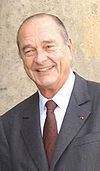 |
Jacques Chirac Jacques Chirac Jacques René Chirac is a French politician who served as President of France from 1995 to 2007. He previously served as Prime Minister of France from 1974 to 1976 and from 1986 to 1988 , and as Mayor of Paris from 1977 to 1995.After completing his studies of the DEA's degree at the... (1932– ) |
17 May 1995 | 16 May 2007 | Rally for the Republic Rally for the Republic The Rally for the Republic , was a French right-wing political party. Originating from the Union of Democrats for the Republic , it was founded by Jacques Chirac in 1976 and presented itself as the heir of Gaullism... (until 2002) Union for a Popular Movement Union for a Popular Movement The Union for a Popular Movement is a centre-right political party in France, and one of the two major contemporary political parties in the country along with the center-left Socialist Party... (from 2002) |
|
| 1995 French presidential election, 1995 Presidential elections took place in France on 23 April and 7 May 1995, to elect the fifth president of the Fifth Republic.The incumbent Socialist president, François Mitterrand, did not stand for a third term. He was 78, had cancer, and his party had lost the previous legislative election in a... , 2002 French presidential election, 2002 The 2002 French presidential election consisted of a first round election on 21 April 2002, and a runoff election between the top two candidates on 5 May 2002. This presidential contest attracted a greater than usual amount of international attention because of Le Pen's unexpected appearance in... |
||||||
| Prime Minister Prime Minister of France The Prime Minister of France in the Fifth Republic is the head of government and of the Council of Ministers of France. The head of state is the President of the French Republic... 1974–1976; on resignation, founded the RPR Rally for the Republic The Rally for the Republic , was a French right-wing political party. Originating from the Union of Democrats for the Republic , it was founded by Jacques Chirac in 1976 and presented itself as the heir of Gaullism... . Eliminated in the first round of the 1981 election French presidential election, 1981 The French presidential election of 1981 took place on 10 May 1981, giving the presidency of France to François Mitterrand, the first Socialist president of the Fifth Republic.... , he again served as Prime Minister 1986–1988. Beaten in the 1988 election French presidential election, 1988 Presidential elections were held in France on 24 April and 8 May 1988.In 1981, the Socialist Party leader, François Mitterrand, was elected President of France and the Left won the legislative election. However, in 1986, the Right regained a parliamentary majority. President Mitterrand was forced... , he was elected in the 1995 election French presidential election, 1995 Presidential elections took place in France on 23 April and 7 May 1995, to elect the fifth president of the Fifth Republic.The incumbent Socialist president, François Mitterrand, did not stand for a third term. He was 78, had cancer, and his party had lost the previous legislative election in a... . He engaged in social reforms to counter "social fracture". In 1997, he dissolved the Assemblée nationale; a left-wing victory in the 1997 legislative elections French legislative election, 1997 French legislative election took place on 25 May and 1 June 1997 to elect the 11th National Assembly of the Fifth Republic. It was the consequence of President Jacques Chirac's decision to call the legislative election one year before the deadline.... , forced him to name Lionel Jospin Lionel Jospin Lionel Jospin is a French politician, who served as Prime Minister of France from 1997 to 2002.Jospin was the Socialist Party candidate for President of France in the elections of 1995 and 2002. He was narrowly defeated in the final runoff election by Jacques Chirac in 1995... Prime Minister for a five-year cohabitation Cohabitation (government) Cohabitation in government occurs in semi-presidential systems, such as France's system, when the President is from a different political party than the majority of the members of parliament. It occurs because such a system forces the president to name a premier that will be acceptable to the... . Presidential terms reduced from seven to five years. In 2002 French presidential election, 2002 The 2002 French presidential election consisted of a first round election on 21 April 2002, and a runoff election between the top two candidates on 5 May 2002. This presidential contest attracted a greater than usual amount of international attention because of Le Pen's unexpected appearance in... , he was re-elected against the leader of the extreme right-wing Jean-Marie Le Pen Jean-Marie Le Pen Jean-Marie Le Pen is a French far right-wing and nationalist politician who is founder and former president of the Front National party. Le Pen has run for the French presidency five times, most notably in 2002, when in a surprise upset he came second, polling more votes in the first round than... . Opposed the Iraq War. He did not run in 2007 French presidential election, 2007 The 2007 French presidential election, the ninth of the Fifth French Republic was held to elect the successor to Jacques Chirac as president of France for a five-year term.The winner, decided on 5 and 6 May 2007, was Nicolas Sarkozy... , he retired from political life and returned to the Conseil constitutionnel Constitutional Council of France The Constitutional Council is the highest constitutional authority in France. It was established by the Constitution of the Fifth Republic on 4 October 1958, and its duty is to ensure that the principles and rules of the constitution are upheld.Its main activity is to rule on whether proposed... . |
||||||
| 23 | .jpg) |
Nicolas Sarkozy Nicolas Sarkozy Nicolas Sarkozy is the 23rd and current President of the French Republic and ex officio Co-Prince of Andorra. He assumed the office on 16 May 2007 after defeating the Socialist Party candidate Ségolène Royal 10 days earlier.... (1955– ) |
16 May 2007 | Incumbent | Union for a Popular Movement Union for a Popular Movement The Union for a Popular Movement is a centre-right political party in France, and one of the two major contemporary political parties in the country along with the center-left Socialist Party... |
|
| 2007 French presidential election, 2007 The 2007 French presidential election, the ninth of the Fifth French Republic was held to elect the successor to Jacques Chirac as president of France for a five-year term.The winner, decided on 5 and 6 May 2007, was Nicolas Sarkozy... |
||||||
| Held various ministerial posts 1993–1995 and 2002–2007. Leader of the UMP Union for a Popular Movement The Union for a Popular Movement is a centre-right political party in France, and one of the two major contemporary political parties in the country along with the center-left Socialist Party... since 2004. In the 2007 election French presidential election, 2007 The 2007 French presidential election, the ninth of the Fifth French Republic was held to elect the successor to Jacques Chirac as president of France for a five-year term.The winner, decided on 5 and 6 May 2007, was Nicolas Sarkozy... , he topped the first round poll, and was elected in the second round against Ségolène Royal Ségolène Royal Marie-Ségolène Royal , known as Ségolène Royal, is a French politician. She is the president of the Poitou-Charentes Regional Council, a former member of the National Assembly, a former government minister, and a prominent member of the French Socialist Party... . Soon after taking office, he introduced the French fiscal package of 2007 French fiscal package of 2007 The French fiscal package of 2007 is a series of measures implemented by the Fillon administration in 2007. The paquet fiscal is often called in France loi TEPA, referring to the law in favor of labor, employment and purchasing power... and other laws to counter illegal immigration Illegal immigration Illegal immigration is the migration into a nation in violation of the immigration laws of that jurisdiction. Illegal immigration raises many political, economical and social issues and has become a source of major controversy in developed countries and the more successful developing countries.In... and recidivism Recidivism Recidivism is the act of a person repeating an undesirable behavior after they have either experienced negative consequences of that behavior, or have been treated or trained to extinguish that behavior... . President of the Council of the EU Presidency of the Council of the European Union The Presidency of the Council of the European Union is the responsibility for the functioning of the Council of the European Union that rotates between the member states of the European Union every six months. The presidency is not a single president but rather the task is undertaken by a national... in 2008, he defended the Treaty of Lisbon Treaty of Lisbon The Treaty of Lisbon of 1668 was a peace treaty between Portugal and Spain, concluded at Lisbon on 13 February 1668, through the mediation of England, in which Spain recognized the sovereignty of Portugal's new ruling dynasty, the House of Braganza.... and mediated in the South Ossetia War 2008 South Ossetia war The 2008 South Ossetia War or Russo-Georgian War was an armed conflict in August 2008 between Georgia on one side, and Russia and separatist governments of South Ossetia and Abkhazia on the other.... ; at national level, he had to deal with the financial crisis and its consequences. Following the 2008 constitutional reform French constitutional law of 23 July 2008 The Constitutional law on the Modernisation of the Institutions of the Fifth Republic was enacted into French constitutional law by the Parliament of France in July 2008, to reform state institutions.-History:... , he became the first President since Louis-Napoléon Bonaparte to address the Versailles Congress Congress of France The French Congress is the name given to the body created when both houses of the present-day French Parliament—the National Assembly and the Senate—meet at the Palace of Versailles to vote on revisions to the Constitution or to listen to an address by the President of the French... on 22 June 2009. President of the G8 G8 The Group of Eight is a forum, created by France in 1975, for the governments of seven major economies: Canada, France, Germany, Italy, Japan, the United Kingdom, and the United States. In 1997, the group added Russia, thus becoming the G8... and the G20 G-20 major economies The Group of Twenty Finance Ministers and Central Bank Governors is a group of finance ministers and central bank governors from 20 major economies: 19 countries plus the European Union, which is represented by the President of the European Council and by the European Central Bank... in 2011. |
||||||
See also
- List of Foreign Ministers of France
- List of Prime Ministers of France
- President of France

